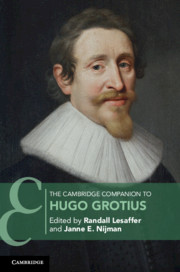Book contents
- The Cambridge Companion to Hugo Grotius
- Cambridge Companions to Law
- The Cambridge Companion to Hugo Grotius
- Copyright page
- Contents
- Contributors
- Preface
- Chronology
- Abbreviations and Short Titles of Works by Grotius
- Editions and Translations of Grotius’ Work
- Introduction
- Part I Grotius in Context
- Part II Concepts
- Part III Grotius as a Man of Letters, Theologian and Political Writer
- Part IV Grotius as a Legal Scholar
- Part V The Reception of Grotius
- 26 Grotius and the Enlightenment
- 27 Grotian Revivals in the Theory and History of International Law
- 28 Grotius in International Relations Theory
- Index
- References
28 - Grotius in International Relations Theory
from Part V - The Reception of Grotius
Published online by Cambridge University Press: 03 September 2021
- The Cambridge Companion to Hugo Grotius
- Cambridge Companions to Law
- The Cambridge Companion to Hugo Grotius
- Copyright page
- Contents
- Contributors
- Preface
- Chronology
- Abbreviations and Short Titles of Works by Grotius
- Editions and Translations of Grotius’ Work
- Introduction
- Part I Grotius in Context
- Part II Concepts
- Part III Grotius as a Man of Letters, Theologian and Political Writer
- Part IV Grotius as a Legal Scholar
- Part V The Reception of Grotius
- 26 Grotius and the Enlightenment
- 27 Grotian Revivals in the Theory and History of International Law
- 28 Grotius in International Relations Theory
- Index
- References
Summary
Hugo Grotius is considered one of the paradigmatic figures in international relations theory.His thought is often contrasted with that of Thomas Hobbes, who is portrayed as the standard bearer of political realism, and the universalist orientation of Immanuel Kant.The centre piece of the so-called Grotian tradition is the theory of international society, which accommodates the claims of independent states without granting them absolute justification.The pursuit of advantage is subject to common standards that oblige rather than merely counsel moderation and restraint.The chapter proceeds in three parts.Part one examines the legal and political narratives that account for the emergence of the Grotian tradition.Part two examines revisionist scholarship that considers Grotius’ thought in the context of relations between Europeans and non-European ‘others’.Neither the standard nor the revisionist narrative provides an adequate account of obligation, without which the theory of international society collapses in confusion.Part three responds to this problem by exploring a part of Grotius’ thought that has been excised from international relations theory: theology.This illuminates an account of obligation that rescues the Grotian tradition from the coarse world of moral scepticism and power politics.
Keywords
- Type
- Chapter
- Information
- The Cambridge Companion to Hugo Grotius , pp. 597 - 618Publisher: Cambridge University PressPrint publication year: 2021
References
Further Reading
- 1
- Cited by

